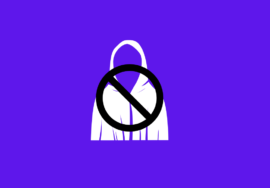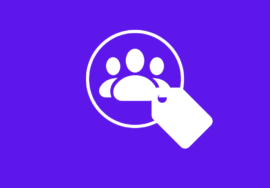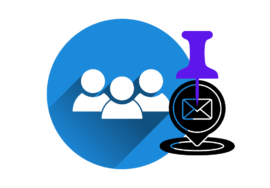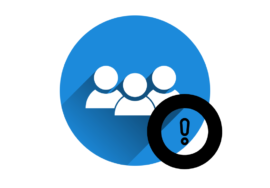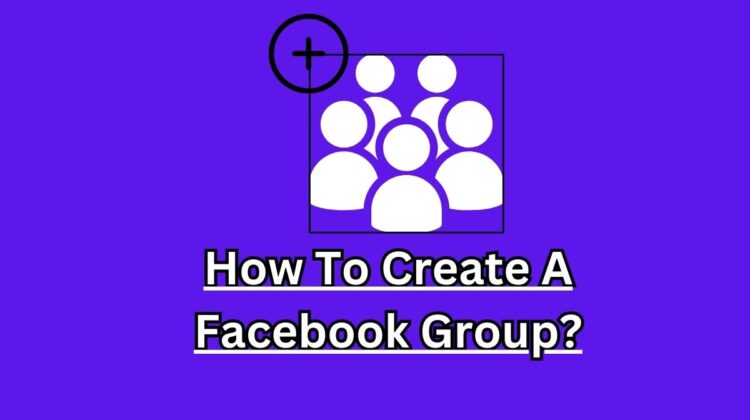
How To Create A Facebook Group- 2024 Perfect Guide
Welcome to the world of Facebook groups! Whether you’re an aspiring entrepreneur, a passionate hobbyist, or simply someone who loves connecting with like-minded individuals, creating a Facebook group can be an incredible way to bring people together and foster meaningful discussions.
But where do you start? How do you choose the right type of group? And how can you ensure that your group thrives in the noisy online world? In the end, how to create a Facebook Group?
In this article, we will explore everything you need to know about creating a successful Facebook group.
From understanding the different types of groups available to managing and tracking their performance, we’ve got you covered.
So grab your virtual pen and let’s dive into the exciting realm of building vibrant communities on social media!
Table of Contents
Types Of Facebook Group
There are several types of Facebook groups you can create based on your interests and goals.
#01. Public Group
The first type is a Public Group, which allows anyone to join and participate in discussions. These groups are great for reaching a wide audience and fostering community engagement.
Whether you want to connect with fellow fans of a specific TV show or discuss current events, public groups offer an inclusive space where people from all walks of life can come together.
#02. Private Group
On the other hand, Private Groups provide a more exclusive environment where membership is controlled by administrators.
These groups require approval for joining, ensuring that only individuals who meet certain criteria or have shared interests become members. This creates a sense of exclusivity and privacy within the group, allowing for more intimate conversations and targeted discussions.
#03. Secret Group
Another type worth mentioning is the Secret Group – these are completely invisible on Facebook’s search results and can only be accessed through invitation.
Secret Groups offer maximum privacy and confidentiality, making them ideal for sensitive topics or closed communities.
#04. Closed Group
There are Closed Groups that strike a balance between public accessibility and private interactions. While anyone can find these groups through search results, membership requires approval from group administrators.
When choosing the right type of Facebook group for your needs, consider factors such as your target audience’s preferences, the level of exclusivity desired, and the nature of discussions you aim to foster.
Remember that each type has its own advantages and disadvantages – so choose wisely!
Advantages And Disadvantages of Public Group
Public Facebook groups offer a range of benefits and drawbacks for users and group administrators alike. Let’s explore the advantages first.
Advantage
One major advantage of a public group is its accessibility. Anyone on Facebook can find, join, and participate in a public group.
This wide reach allows for greater exposure to diverse perspectives and opinions, fostering robust discussions.
Additionally, public groups tend to have larger membership numbers compared to private groups. With more members comes more potential for engagement, collaboration, and networking opportunities.
This can be especially beneficial for businesses or organizations looking to connect with their target audience.
Disadvantage
On the flip side, there are some disadvantages associated with public Facebook groups as well.
One key concern is privacy. Since anyone can join these groups, it may attract trolls or individuals who disrupt conversations or engage in inappropriate behavior.
Another drawback is the lack of control over content moderation in public groups.
Administrators need to carefully monitor posts and comments to ensure adherence to community guidelines and prevent spamming or offensive material from circulating within the group.
While public Facebook groups provide an inclusive platform for open discussion and wider participation, they require vigilant management due to privacy concerns and potential misuse by certain individuals.
Advantages And Disadvantages Of Private Group
Private Facebook groups offer a wealth of advantages for those seeking more exclusive and controlled communities.
Advantage
One major advantage is the ability to maintain privacy and control over who joins the group. This allows for a higher level of trust and security among members, as only approved individuals can access the content.
Another advantage of private groups is that they foster a sense of exclusivity and belonging. Members feel special knowing they are part of an invite-only community where their opinions are valued.
This creates a stronger bond between members and encourages active participation.
Moreover, private groups provide a safe space for open discussions on sensitive or personal topics without fear of judgment or backlash from outsiders.
Members can freely share their thoughts, seek advice, and connect with like-minded individuals in a supportive environment.
Disadvantage
However, it’s important to acknowledge some potential drawbacks of private groups as well. Limited visibility may hinder growth opportunities since these groups are not easily discoverable by non-members.
Consequently, attracting new members might require proactive outreach efforts outside the platform itself.
Additionally, managing a private group requires diligent monitoring to ensure that conversations remain respectful and within established guidelines. Moderators play an essential role in maintaining order while allowing for diverse perspectives.
Private Facebook groups have distinct advantages such as increased privacy, exclusivity, and fostering meaningful connections among members.
However, careful consideration should be given to balancing these benefits with potential limitations in terms of visibility and management responsibilities.
How To Choose The Niche Of Facebook Group
When it comes to creating a Facebook group, choosing the right niche is crucial. Your niche will determine the type of audience you attract and how engaged they are with your group’s content.
Here are some tips to help you choose the perfect niche for your Facebook group.
#01. Consider Interests And Passions
Consider your interests and passions. What topics do you enjoy discussing? Building a group around something that genuinely excites you will make it easier for you to create engaging content and connect with like-minded individuals.
#02. Examine Future Problems And Challenges
Next, think about what problems or challenges people in your target audience might be facing. Is there a specific area where they need guidance or support?
By focusing on solving their pain points, you can position yourself as an expert and build a community that provides value.
#03. Research Existing Group Of Your Niche
Additionally, research existing groups within your potential niches. Are there already active communities discussing similar topics? If so, take note of what makes them successful and identify any gaps that you could fill with your unique perspective.
#04. Consider Scability Of Your Niche
Consider the scalability of your chosen niche. Will there be enough content ideas and discussions to sustain long-term engagement?
It’s important to choose a topic that allows for ongoing conversations rather than one that may quickly become outdated or lose momentum.
By carefully selecting the niche for your Facebook group, you can create a thriving community filled with passionate members who share common interests and goals.
How To Create A Facebook Group
Creating a private Facebook group is a great way to bring together like-minded individuals in a more intimate and exclusive setting. Here’s how you can create your own private Facebook group:
- Log in to your Facebook account and go to the Groups section on the left sidebar.
- Click on “Create New Group” and choose the “Privacy” option when prompted.
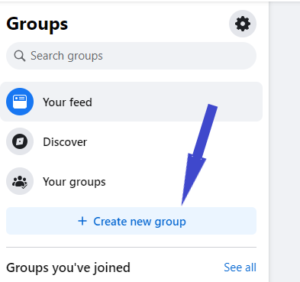
- Give your group a descriptive name that reflects its purpose or niche.
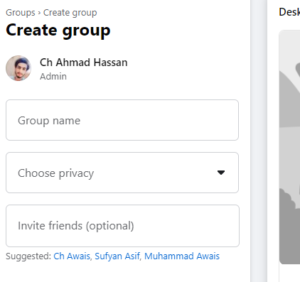
- Add members to your group by typing their names or email addresses into the designated field.
- Set privacy settings according to your preferences, such as whether members can add others or if posts require approval before being visible.
- Customize your group’s appearance by adding a cover photo and description that clearly outlines its goals and rules.
Remember that creating a successful Facebook group takes time and effort in building relationships with members while providing value through meaningful interactions!
How To Manage A Facebook Group
Managing a Facebook group requires effort and dedication to ensure its success. Here are some essential tips on how to effectively manage your Facebook group:
1. Set Clear Guidelines
Establishing clear rules and guidelines for the group will help maintain order and prevent any potential conflicts or misunderstandings among members.
2. Engage With Your Members
Actively engage with your members by responding to their comments, questions, and concerns. This shows that you value their participation and creates a sense of community within the group.
3. Post Relevant Content Regularly
Keep the momentum going by sharing interesting and relevant content on a consistent basis. This helps keep members engaged and encourages them to participate in discussions.
4. Foster Meaningful Discussions
Encourage meaningful discussions by asking thought-provoking questions or sharing informative articles related to the group’s niche. This allows members to share their insights, opinions, and experiences.
5. Moderate Appropriately
As a manager, it’s important to moderate the group effectively without stifling freedom of expression. Remove spam or offensive posts promptly while allowing healthy debates within respectful boundaries.
6. Collaborate With Other Admins/Moderators
If you have multiple admins or moderators in your group, collaborate with them to ensure consistent management practices are followed throughout.
7. Track Analytics
Utilize Facebook’s built-in analytics tools to track the performance of your group such as member engagement levels, post reach, demographic data etc. These insights can help you understand what is working well for your audience so that you can continue delivering valuable content.
Remember that managing a successful Facebook Group takes time and patience but can be incredibly rewarding when done right!
How To Track the Performance Of A Facebook Group
Tracking the performance of your Facebook group is crucial to understanding its growth and engagement. By analyzing key metrics, you can make informed decisions to improve the overall success of your group.
If you have less than 50 members in your Facebook Group, you can track the performance of the group by following the below instructions.
#01. Monitor Members Activity
One way to track performance is by monitoring member activity. Keep an eye on how many members are actively engaging with posts, commenting, and sharing content. This will give you insights into the level of interest and participation within your group.
#02. Analyze Post Reach And Engagement
Another important metric to consider is post-reach and engagement. Look at how many people are seeing each post and how they’re interacting with it through likes, comments, and shares. You can use this data to determine the kinds of content that your audience responds to the most.
#03. Observe The Joining Of New Members
You should also track membership growth over time. Pay attention to the rate at which new members are joining and compare it against any promotional efforts or changes made within the group.
Moreover, if your Facebook Group has more than 50 members, you can track group performance in a better way like:
Conclusion
Creating a Facebook group can be a powerful tool for connecting with like-minded individuals, building communities, and fostering meaningful discussions.
Whether you choose to create a public or private group depends on your specific goals and needs.
Public groups offer the advantage of reaching a wider audience and attracting more members. They can be great for promoting businesses or causes, but they may also attract spam or irrelevant content.
On the other hand, private groups provide a more intimate setting where members feel safe sharing personal information and discussing sensitive topics.
When choosing the niche of your Facebook group, it’s important to consider your interests, expertise, and target audience.
Selecting a niche that aligns with these factors will help attract the right people who are genuinely interested in engaging with your content.

